Instincts, gut feelings, hunches, premonitions … all of these words point to a deep capacity that we all carry inside known as intuition.
The word intuition originally came from the Latin word intueri, which meant “to contemplate” or “to look within.”
Without learning how to look and listen to our intuition, we tend to rely solely on the limited rational mind or external input from others, which can quickly lead us astray.

Soul Work Compass Course:
Feeling lost, stuck, and trapped in repetitive cycles of pain? Discover your Soul's Compass to reclaim your purpose and find your path to freedom.
⭐️⭐️⭐️⭐️⭐️ "I am finding out so much about myself and having so many realisations about my life ... I already know it is what I’ve needed for so long." – Jen N.
Many scientists and researchers are now referring to intuition as the highest form of intelligence we possess.
In other words, intuition is no longer limited to the new age world of magical thought; it is increasingly being seen as a legitimate way to make judgments and decisions.
Unsurprisingly, spiritual traditions for thousands of years have all known and revered the powers of intuition.
Buddhist, Islamic, Hindu, and Western philosophy have all connected intuition with planes of higher consciousness or the Soul. The Advaita Vedānta for example (a school of Hindu thought) values intuition as an experience through which a person can contact and experience Brahman (Spirit/God).
Swiss psychiatrist Carl Jung also believed that intuition is a powerful force, once writing,
Intuition gives outlook and insight; it revels in the garden of magical possibilities.
Personally, I see intuition as the “Soul’s GPS” which can help us to discover our life purpose, make wise decisions, and lead fulfilling lives. In this article, I’ll show you how to trust your intuition and break through the fearful voice of the mind.
Table of contents
What is Intuition?
Intuition is a sudden and inexplicable feeling that arises within us. Also referred to as the instinct, sixth sense, inkling, hunch, and gut feeling, intuition is the mysterious force that guides, protects, and informs us.
Want to get LonerWolf at the top of your Google search results?
The information we receive from our intuition is not usually available from our conscious mind and thus stems from the unconscious.
What common ways do we experience intuition?
Usually, intuition emerges as a quiet inner voice or feeling that tells us to take this chance, go down that path, accept that opportunity, open this door, and so on.
Intuition can also manifest as various synchronicities or messages from one’s spirit guides to signal that we’re on the right road.
Furthermore, intuition also tells us what not to do, what to be careful of, when to be vigilant, and when to stop what we’re doing.
How Does Intuition Arise?

Intuition is associated with the right side of the brain which is responsible for creativity, imagination, musical and artistic aptitude, and emotions.
The left side of the brain, on the other hand, is connected with logic, reasoning, and critical thinking (we tend to favor the left brain over the right brain in the West).
Intuition stems from that nonlinear dimension of our minds, that part where unconscious connections and associations are made and arise within our conscious minds seemingly out of nowhere.
As Joseph Murphy, author of The Power of Your Unconscious Mind notes:
Within your subconscious depths lie infinite wisdom, infinite power, and infinite supply of all that is necessary, which is waiting for development and expression.
Intuition is an amazingly powerful tool – a natural gift of our biology that is ready and available to us at any time.
Would you like to save this?
Your information will never be shared.
However, sadly, the gift of intuition is often ignored and forgotten by us humans. Thankfully, there are so many exhilarating ways of learning how to tap into this inner wellspring of wisdom again!
Intuition and Spiritual Awakening
Intuition is an innate quality we all possess. Yet many of us don’t recognize how vital it is until we’ve gone through some kind of life crisis or spark of spiritual awakening.
Without our intuition, we feel adrift in life. We lack a sense of inner centeredness – of spiritual direction and Soul-centered insight.
In some ways, we feel empty and bereft without this sacred heart voice.
Indeed, our intuition is a direct line to our Higher Self that offers us all the spiritual guidance we need in this life.
Why Learning to Trust Your Intuition is Powerful (and a Little Intimidating!)
Don’t try to comprehend with your mind. Your minds are very limited. Use your intuition.
– M. L’Engle
All throughout history people have listened closely to the whispers of their intuition.
From Dr. Loewi’s intuitive discovery of the chemical transmission of nerve impulses, and Elias Howe’s invention of the sewing machine, to Isaac Newton’s theory of gravity, many great strides in existence have been attributed to spontaneous sparks of intuition.
But why should we pay attention to our intuition?
I mean … it’s not like we’re planning on becoming world-famous physicists or inventors, right? Wrong. You don’t need to strive to do or be anything extraordinary. Intuition is very down-to-earth and can help us in any area of life!
Here’s why learning to trust our intuition is so powerful:
1. Intuition reveals deep truths in our lives
Intuition helps us develop a deeper level of understanding and insight about ourselves, other people, and life at large. The result is that we feel more intelligently and intentionally guided in our thoughts, feelings, and decisions.
2. Intuition helps us identify negative omens in our lives
Failure, financial collapse, death, emotional threat – intuition puts us in touch with our instinctive defense systems, helping us to avoid harm. (By the way, how eerie but cool is that!)
3. Intuition opens new paths to us
By helping us to tune into fresh opportunities and positive signs in our lives, intuition opens new doors when we least expect it – it’s quite magical.
4. Intuition guides us and helps us to make wise decisions
By allowing us to know what decisions to make and when, intuition helps us to achieve a measure of confidence and peace of mind, assisting us in following paths that are true to ourselves: paths with heart.
5. Intuition helps us to live fulfilling lives
Truth hurts, but truth also helps us to wake up to the false, corrupted, and delusional lives that we sometimes lead and the wayward choices we occasionally make. Ultimately, intuition is a bringer of truth and thus a bringer of change and transformation. When we listen to it, we make decisions that ultimately help our lives to be genuine and fulfilling.
For over 12 years, we've poured our hearts into creating free content on this website. Unlike many platforms, we believe this guidance should be accessible to everyone. If this post empowered you in any way, please consider making a donation to keep us going. Any amount (one-time or ongoing) makes a huge difference.
How to Distinguish Fearful Thoughts From Intuition

I sometimes FEEL that I am right. I do not KNOW that I am.
– Albert Einstein
Unfortunately, it’s very common for us to confuse the voice of intuition with the voice of fear.
For us to make the most intelligent, successful, wise, loving, and meaningful decisions in our lives, we need to learn how to make a clear distinction between the two.
As a person who has a very strong “inner skeptic,” it has been difficult for me to loosen my rational brain in favor of my intuition. As one given to overthinking, my mental voice has always been quite strong and persistent. I’m sure you have struggled with this to some extent too.
What helped me to distinguish fearful thoughts from intuitive guidance was to pay attention to how each inner voice felt in my body.
Here are some main differences between fear and intuition.
Fear:
- Feels heavy and dark
- Emotionally-charged (e.g., “I need to do this or else ____ will happen!!”)
- Vague
- Makes you feel frustrated, overwhelmed, confused or anxious
- Causes you to ruminate and get lost in cycles of thought
Intuition:
- Feels light
- Unemotional
- Crystal clear
- Makes you feel calm, inspired, and a sense of resolution
- Spontaneously arises and immediately feels “right” without further rational thought
By paying attention to these signs, you will slowly be able to distinguish paranoid thinking from neutral and intuitive knowing.
How to Trust Your Intuition (9 Ways)

Intuition means exactly what it sounds like, in-tuition! An inner tutor or teaching and learning mechanism that takes us forward daily. It is a resource that, where recognized, has infinite potential.
– Sylvia Clare
Intuition is an essential life skill that we must all learn to refine and develop, preferably sooner rather than later.
Without intuition, we get stranded in labyrinths of rigid, agitated, or obsessive thoughts that limit our capacity to see clearly. The less clearly we can see, the more likely we will make bad decisions.
When we listen to our intuition, we experience a kind of clarity that helps us to make the most beneficial choices for our lives.
We can learn how to trust our intuition in nine main ways:
- Silence your mind
- Ask yourself, “How do I feel about this decision?”
- Focus on the sensations in your body
- Explore whether fear is fueling you
- Formulate your conclusion, and live both scenarios
- Don’t allow pressure to bias you
- Ask for guidance
- Develop more self-awareness
- Clear your third eye chakra
Below I’ll explore each of these points more in-depth to help you learn how to trust your intuition more easily:
1. Silence your mind

Often the mind tends to hijack our decision-making processes.
While it is important that you use rational thought, your usual thinking is often subject to prejudice, past beliefs, external influences (“peer pressure”), and fear.
To access your intuition, you need to clear your mind of thought. In order to clear your mind, I recommend that you meditate, listen to some relaxing music, or focus on mindful breathwork techniques.
It is amazingly difficult to listen to your intuition when you’re in a stressed-out state of mind!
For example, you might like to try breathing deeply for a few minutes. Breathe in through your nose and allow your belly and chest to gently expand. Then, slow your breath to the count of four and breathe in slowly for four seconds, hold for four seconds, and breathe out for four seconds.
Try doing any practice that relaxes and stills your mind. Only once you are calm and centered can you accurately access your intuitive power.
Helpful article: Spiritual Meditation Techniques »
2. Ask yourself, “How do I feel about this decision?”

Once you’ve relaxed your mind and body, inwardly ask yourself, “How do I feel about this decision/situation/person?”
Notice the first feeling, sensation, word, or image that arises within you. Don’t overthink it! Your first impression is generally the most accurate, so stick with whatever that was.
You might like to write down whatever appears and reflect on it some more.
3. Focus on the sensations in your body
Our bodies are like exquisitely accurate truth radars that alert us to the full scope of pleasure, pain, and everything in between. It’s for this reason that connecting with your body is a powerful way to learn how to trust your intuition.
No matter how elaborate the stories or theories our minds create are, our bodies will always reveal the truth of the matter!
In order to connect with your intuition, try thinking about something weighing on you like an important decision, and focus on your body’s response.
For example, if you want to quit your job, you might notice a sensation of relief flood your entire body (which is a sign that you should quit your job!).
Alternatively, if you’re thinking of moving to a certain town, you might feel your shoulders and neck tense up (which is likely a clear sign that you shouldn’t move there!).
By practicing body-centered mindfulness, you’ll be able to connect more freely with your intuition.
4. Explore whether fear is fueling you
Fear has a sneaky way of disguising itself as intuition.
When we’re fearful, we tend to make rash decisions or believe that we’re “following our intuition” because of how strong the mental voice inside us can become.
When you’re faced with an important decision, try writing down all of your fears surrounding the situation on a piece of paper. This simple activity will help you to create more inner space and clarity – and learn to trust your intuition more.
Struggling with inner blockages?
Learn how to transform your confusion into clarity. With 50+ deep dive prompts, your journey of self-discovery awaits in our Alchemical Soul Work Workbook.
By making your fears visible, you’ll be able to determine whether the voice within you is driven by fear or clear intuitive knowing.
5. Formulate your conclusion and live both scenarios

Another way you can learn how to trust your intuition more is to come up with a range of solutions to the problem at hand and mentally live out each scenario.
Visualize each choice as vividly as you can, then pay attention to how each option feels in your heart and body. Whichever option feels the most “right” is the choice you need to go for.
For instance, if you’re trying to decide whether to have an uncomfortable conversation with someone, your solutions may be the following:
- Have the conversation over dinner
- Delay the conversation to next week
- Bring up the conversation casually
- Avoid the conversation until it’s necessary
You’d then visualize each scenario and notice how you feel. Whichever one you feel intuitively drawn toward (even if your mind doesn’t like it) is the right path to take.
6. Don’t allow pressure to bias you

Are you putting a lot of pressure on yourself? The pressure to make a “quick decision” tends to inhibit the flow of intuition.
While intuition can work under strenuous circumstances, if you have the option to slow down, please do.
Just because you aren’t obsessing over something consciously doesn’t mean that the thought isn’t bubbling in your subconscious mind.
Sometimes putting decision-making on the “back burner” helps you to relax, adopt new perspectives, and open more easily to the presence of your intuitive knowing.
As such, sometimes, in order to trust your intuition and know that you’re walking the correct path, you just need to take a step back for a while.
7. Ask for guidance
Intuition is seeing with the soul.
– Dean Koontz
When I struggle to access my intuition, I say a prayer of guidance asking my Soul for support.
If you’re struggling with accessing your intuition, say a small prayer to whomever or whatever you believe in (e.g., your Higher Self, Soul, Spirit, God, Allah).
You don’t need to be religious to pray. Prayer is essentially condensed energy or directed intention which helps you to focus your willpower. Saying a prayer is a powerful way to enhance your intuitive prowess.
8. Develop more self-awareness

Self-awareness is the ability to be aware of your feelings, thoughts, and behaviors and the way in which they impact you and the people around you.
The more aware we are of what goes on inside of ourselves, the easier it will be to identify the quiet voice of our intuition in the first place.
Mindfulness, meditation, and introspection all assist in developing self-awareness. However, for an easy way to begin to trust your intuition, start journaling. Learning how to journal is a relaxing and grounding way of getting to know yourself more.
9. Clear your third eye chakra
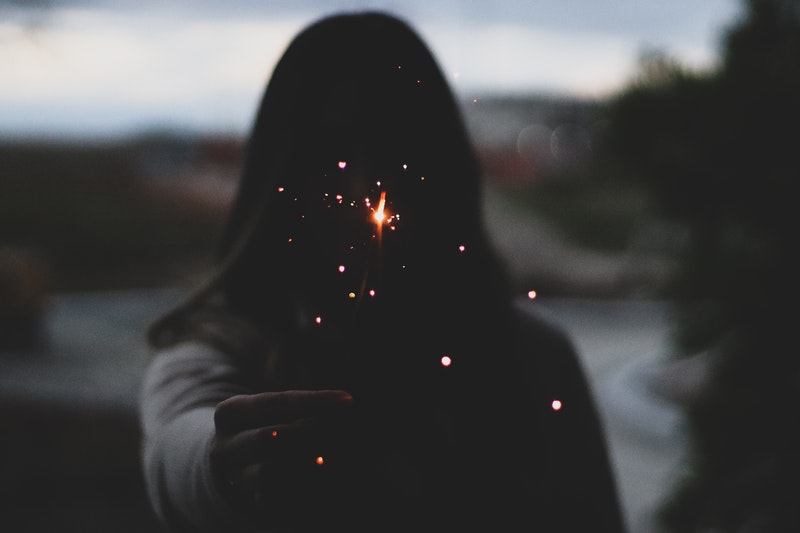
If you resonate with chakra healing, focus on balancing your third eye chakra, which is the center of your intuitive abilities.
If you struggle with problems such as negative thinking patterns, over-thinking, paranoia or anxiety, you most likely have a third eye chakra problem.
There are many ways to unblock this chakra – we explore them in our how to open your third eye article.
Intuition FAQ
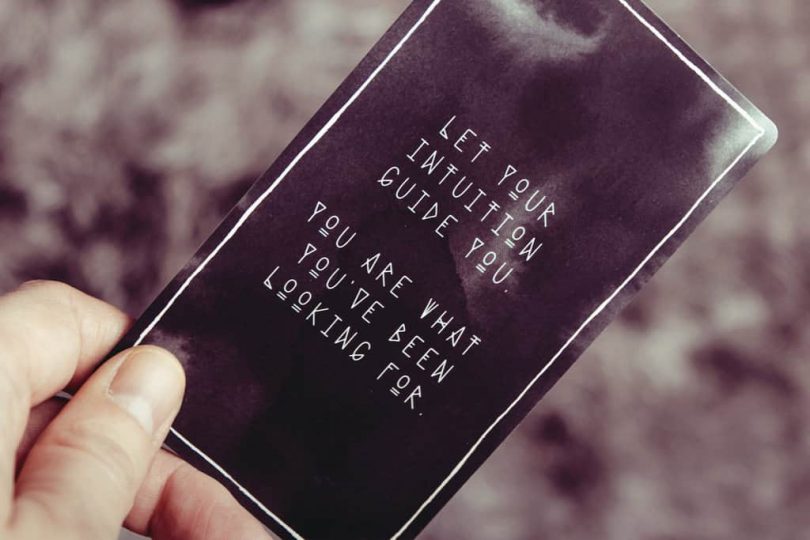
There are so many facets involved in learning how to trust your intuition. If you’re still in need of guidance, the following Q&A’s might help:
This is a tricky question to answer, but in short, pure intuition is never wrong. But intuition that is tainted by thoughts can be wrong. As intuition stems from the unconscious and universal mind (also known as the ‘Collective Unconscious’) that has access to a tremendous amount of information, the insights it relays are far more accurate than pure rational thinking. When intuition is clouded and foggy, it’s more likely for it to be wrong or misguided. This is why learning how to distinguish the voice of fear from the voice of intuition is crucial.
The feeling of intuition varies for everyone. For some people, it will be very physical. It’s common, for example, to experience tingles down the spine, a rush of energy, goosebumps, a pit in the stomach, and so on. Others experience intuition as something more mental. For instance, some people get visual flashes (such as premonitions or visions) and others get a quiet (and in some instances loud!) inner voice arising within them.
There are endless examples of intuition out there. Intuition, for example, can arise in moments before a crisis directing a person to do/not do something that can have dire life or death consequences. Many individuals have intuitive feelings of dread or joy before making big life decisions. Intuition can also emerge in everyday situations such as what present to buy someone, what’s really wrong with your partner or best friend (“something doesn’t feel right”), and what route to take to work.
Yes, everyone has the capacity to be intuitive. It’s just a matter of learning how to tap into your unconscious mind. While intuition might come more easily to some, it’s ultimately a skill that needs to be honed and developed.
***

Intuition is a small glimpse into the enormous magnitude of wisdom and intelligence possessed by your largely secret and untapped unconscious mind.
By learning how to silence your mind, connect with your body, identify fearful thoughts, and clear energy blockages, you’ll find it easier to access your intuition in any life circumstance.
I hope this article has helped to give you more insight and guidance on how to trust your intuition. Please share any tips you have for trusting intuition below!
If you need more help, we offer 2 powerful ways to guide you on your inner journey:
1. The Soul Work Compass Course: Break free from feeling lost and disconnected. The Soul Work Compass is a practical 12-step course that transforms soul loss into soul clarity. Discover your core values, heal core wounds, and create a personalized compass to guide every decision you make.
2. The Inner Work Journal Bundle: Heal at the root. This Inner Work Journal Bundle guides you through self-love, inner child healing, and shadow integration with 150+ prompts and activities. You get editable digital files to use on any device or print unlimited times. Not for lukewarm seekers, these journals are for those ready to transform.

 $3
$3
Thank you!
Excellent article!! But I have to add my intuition has proven right on a number of occasions when it felt heavy and low-fearful because it was dark/evil that was being felt and avoided, etc.
Always helpful.
Pleased to meet another person with a strong inner critic. :)
Learning to listen without judgment is something I’ve had to learn over and over again–sometimes the hard way. It pays off, though.
I constantly second guess myself so it’s next to impossible to discern the difference.
The distinction you made between intuition and fear is something I haven’t seen anyone make before, and reading that has just clarified something for me.
I’ve recently graduated university as a music teacher. I’m a city person; I’d sworn to myself I wasn’t going to move to a rural location for a teaching job, even if it meant not having work upon my graduation. (And there’s not much going for music teachers in Perth, especially graduates.) That said, as I was looking for work online I felt myself… drawn… to a particular ad. It was for a school in a regional town two hours south of Perth. They were looking for a teacher with a background in jazz performance, which I had. I was curious; why was a regional school looking for such a specific (and rare) skill set? I decided to skim their website. Turns out they were running a specialist jazz program, which heightened my curiosity even more.
There was so much about the position which was frightening. It was only 0.4, which wouldn’t pay enough to survive on. (I wouldn’t be able to pay rent, let alone eat.) Then there was the distance from Perth, and the prospect of moving out of home completely unplanned with very little money behind me. But something about it made me want to know more, so I shot off an email to the principal asking about relief work possibilities on top of the 0.4 music.
He emailed back inside 15 minutes asking me to call the school. I did so. The moment I started speaking to the principal and deputy on the other end, my worries began melting away. They called back the next day asking me down for an interview. (For the record, this is NOT how one usually gets a job in the WA Education Department!)
What lingering doubts I possessed were banished as soon as I stepped onto the grounds and began speaking to the staff. The atmosphere was so easygoing yet professional, and the people were great. The entire place just felt ‘right’, like I was meant to be there. I was offered the job at the end of the interview and I accepted without hesitation. So what if I had nowhere to live and no guarantee of a liveable wage? I had a feeling everything would work out, and it overruled all fear.
Well, two weeks later I was back up looking at rental properties and dropped into the school to give them some paperwork. Turns out their drama teacher had just resigned… and guess who was asked on the spot to work full-time teaching drama in addition to music?
It was pure intuition which led me to sitting here now, a weekend away from commencing my first teaching position. I ignored every obstacle where fear might have gotten the better of me, relying on gut instinct that I was doing the right thing. I’m not always great at listening to my intuition, and I often bend under feelings of uncertainty, but I can honestly say I’ll be trying to listen far more intently from this point forward.
I guess what I meant in all that ramble was I’m often guilty of mistaking fear for intuition warning me away from something, making me say “no, I don’t want to do that”… but this time the real intuition was so overwhelmingly powerful, I could recognise the fear for what it was and ignore it.
That is wonderful Kaylene, congratulations. :)
Yes, fear can sometimes be easily mistaken for fear, but intuition – once you hone your ability to stay in touch with your body – is easy to ‘feel’. There is a feeling of pureness, that is the best way I can describe it – as though something is ‘meant’ to be – a perfect fit to the keys you hold.
I do hope this knowledge can stay with you in the future. Thank you for leaving a comment!
Absolutely love this topic. Really interesting! There have been many times when I have followed my intuition in my creative pursuits, not knowing why just knowing that it’s necessary. And these moments invariably lead to the biggest breakthroughs. Intuition is still thought – it is beneath the facade of the ego and beyond the position of your inner critic. It knows before ‘you do’ what you need to focus on or what steps to take. The mind sure can be an unfathomable mystery! Thanks so much for this.
Thank you Andy, I’m delighted to hear that you enjoyed the article. :)
Precisely. Intuition is an unconscious thought (or thoughts) that manifest themselves as feelings. The unconscious mind really is a fascinating source of inspiration and wisdom, and one that I hope to explore more in the future. Amazing how we think we know ourselves well when often, we barely have even skimmed the surface.
Thank you for your comment.
-Luna
I have trusted my intuition for many years, and there have been times that it has literally saved my life.
The more I don’t question and follow it the better and more precise it gets.
I cant say that I rely on it, but I just let it guide me.
Thank you.
It’s good to have a balance of mind and heart, you’re right Mike. Thank you for reading!
-Luna
What an interesting topic! instinct is so mysterious. i wish. I WISH i can use my instinct often but i don’t know how to use it on my own (like a superpower). hehe
I find it difficult to realize it is an instinct from the beginning. and i can’t tell if instinct is just another luck or it has an explanation to be occurred.
Instinct “save” me in my entirely life.
Thank you to God who has create this intuition things. :)
Hey Iqbal. Thank you for your comment. :)
If you are interested in becoming more in-tune with your instincts, you should try developing more self-awareness (which was mentioned above in the article). This is the first step.
-Luna
I rely on intuition for all of the major decisions in my life. The depth of intuition’s wisdom is far greater than the limited reach of logic and pragmatism. I’ve noticed other people are unnerved by this type of abstract decision making: “So what’s your plan?” they ask. Oh, I have a plan, I just don’t know what it is yet :)
Love that Dean Koontz quote!
“I have a plan, I just don’t know what it is yet”, haha, I love it Red. Many people shy away from using their intuition as a guide because they crave certainty, they crave linearity, and this all stems from fear – an inability to trust yourself, and an inability to trust life.
When truly listening to our instincts, we rarely go wrong.
Thank you for your comment!
-Luna
I’m a firm believer in my gut and have been listening to and following it for most of my life. Red’s comment regarding his plan made me smile. I once asked a Regional VP, known for being “frugal” (aka cheap) and stodgy, for a large advance on my salary as directed by my intuition. He sat there, silently, a tad surprised, for several minutes after I’d made the request. When he finally spoke, he had 2 questions: 1) did the company policy allow advances (yes), and 2) what was my plan if he said no?
“Drop back and punt,” I replied. Frankly, I had no backup plan because intuition. A look of complete surprise flashed over his face and he laughed, loudly. I can’t prove it but I feel reasonably sure my lack of plan B coupled with a frank answer couched in football lingo is why he said yes and I got my advance. Well, that and the fact my intuition wouldn’t steer me wrong.